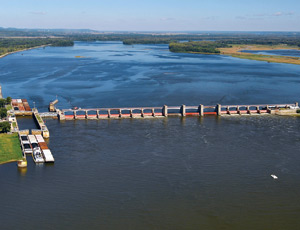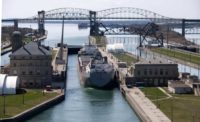Early work has begun in the House on a new Water Resources Development Act (WRDA), which would authorize new Corps of Engineers civil-works projects and mandate changes in Corps policies. No bill has been introduced, but lawmakers already have flooded the Transportation and Infrastructure Committee with hundreds of requests for projects in the new WRDA. Industry groups want to see the bill provide higher Corps spending, plus changes in policies and project cost shares.

Long lists of projects spread among many states and congressional districts have long been prime political engines for WRDAs. The last one, enacted in 2007 over a presidential veto, had $23.2 billion for more than 900 projects or studies.
House committee Chairman James Oberstar (D-Minn.) said on April 15 that his panel has received more than 2,000 requests for projects and studies in the WRDA it is drafting. He says Republicans have asked to withdraw some projects they requested, following a GOP anti-earmark move. Even so, plenty of projects are still in the hopper.
WRDAs only authorize funds; construction hinges on appropriations. Projects in a new WRDA would be added to the 2007 measure’s 900. “Many of [those] have not moved forward at all,” says David Conrad, National Wildlife Federation senior water-resources specialist.
Inland-waterways groups propose hiking spending on locks and other projects to an average of $380 million a year, from $170 million. Financing would be $270 million per year from the general fund and $110 million from the Inland Waterways Trust Fund. The fund would be bolstered by boosting the 20¢-per-gallon waterways fuel tax by 6¢ to 9¢.
The plan also would raise the federal share for river-dam work to 100%, from 50%. Waterways interests contend the dams’ non-navigation benefits merit the higher federal share. But Conrad criticizes the idea, saying, “They’re trying to rewrite history on the backs of the general taxpayers.”
The American Association of Port Authorities wants the bill to require “full use” of the Harbor Maintenance Trust Fund, says Dave Sanford, AAPA’s director of navigation policy and legislation. The fund’s estimated 2010 surplus is $6.3 billion. AAPA also proposes a 65% federal cost share for channel dredging to 53-ft. depths. The 65% share now applies to dredging up to 45 ft. depths.
Sanford expects Oberstar to move a WRDA bill through committee this year. But he and Conrad acknowledge that getting a measure enacted in this election-shortened session will be a long shot.



Post a comment to this article
Report Abusive Comment